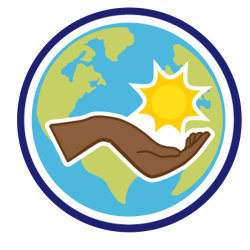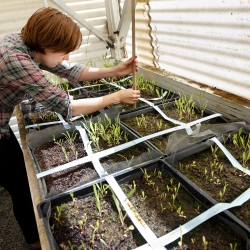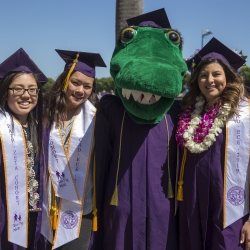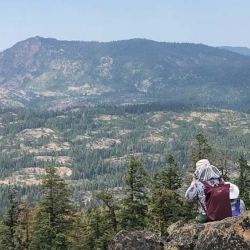
Climate Change Certificate
SF State's Climate Change Certificate offers an interdisciplinary approach to addressing the climate crisis. Open to students of all majors!

Sustainability Research
Faculty and students are engaged in a wide range of sustainability-related research on campus.

Environmental Sustainability Graduation Requirement
SF State requires students to take a least one course in areas that the campus feels are important, including Environmental Sustainability.

School of the Environment
Launched in August 2023, the School merged the Dept. of Earth & Climate Sciences, Dept. of Geography & Environment, and the Environmental Studies Program.
SF State is dedicated to educating our students about sustainability. SF State was an early adopter of a sustainability graduation requirement and offers numerous sustainability-focused academic programs.
- All baccalaureate degrees are required to take at least one Environmental Sustainability (ES) course to meet their General Education requirements, along with Social Justice, Global Perspectives and American Ethnic and Racial Minorites requirements.
- Starting in 2022, SF State offers a Climate Change Certificate. The Climate Change Certificate program gives students a foundational understanding of climate change’s causes, effects and solutions so they can take action in their communities. While some of the courses that count toward the certificate are in the sciences, the program is not exclusively for science majors. In fact, the program was designed so that students from any major can take any course — there are few to no prerequisites. It’s also open to matriculated and non-matriculated students and students who aren’t working toward a specific degree.
- SF State offers 445 sustainabity-focused and sustainability-inclusive courses across 78 departments.
- SF State offers several undergraduate and graduate majors with a sustainability focus including environmental studies, earth sciences, urban studies & planning, interdisciplinary marine & estuarine sciences, and more.
- SF State’s Romberg Tiburon Campus an extraordinary 53 acre bayside campus on the Tiburon Peninsula in Marin County, California, is an ideal setting for realizing the synergistic and creative potential of these outstanding programs for the region. Access to the water through a deep water port is critical for marine science and education, and a rare asset in SF Bay. Surprisingly, no other institution of higher education has a marine science laboratory located on SF Bay; SF State’s is the only one.
- SF State's Sierra Nevada Field Campus immerses students in one of the most beautiful and wild regions of the northern Sierra Nevada as they study connections with the natural environment. The campus allows students of the environmental sciences get hands on experience. Students live at the campus in tents during their enrollment, creating an immersive learning experience. Courses cover a range of disciplines and share a focus on conservation and the natural environment. Courses are open to the public. Courses range from a few days to a week and students may enroll in consecutive sessions.
Sustainability Majors, Courses and Scholarships
Want to have a sustainability-focused major? SF State offers several majors, minors, graduate programs and certificates related to sustainability and environment. Check these out!
- Certificate in Climate Change
- Certificate in Geographic Information Systems (GIS)
- Certificate in Ethnic Studies Empowerment
- Graduate Certificate in Sustainable Business
- Minor in Biology
- Minor in Earth Sciences
- Minor in Geography
- Minor in Queer and Trans Ethnic Studies
- Minor in Race & Resistance Studies
- Minor in Recreation, Parks and Tourism
- Minor in Urban Studies and Planning
- BA in Biology
- BA in Environmental Studies
- BA in Environmental Studies (concentration in Natural Resource Management and Conservation)
- BA in Earth Sciences
- BA in Geography
- BA in Race & Resistance Studies
- BA in Race, Ethnicity and Health
- BA in Urban Studies & Planning
- BA in Women and Gender Studies
- BS in Environmental Science
- BS in Biology (concentration in Ecology)
- BS in Biology (concentration in Marine Science)
- BS in Earth Sciences
- MA in Geography
- MA in in Women and Gender Studies
- MS in Biology (concentration in Integrative Biology)
- MS in Geographic Information Science
- MS in Geosciences
- MS in Interdisciplinary Marine and Estuarine Sciences
Find more information about majors on the Acedemic Bulletin.
Want to find a sustainability-focused course? SF State offers hundreds on classes on an array of subjects. Check out these courses and categories!
- Climate Ambassadors Course (COMM/ENVS 675)
- Climate Change: Applied Learning for the Real World (BIOL 681)
- American Indian Studies (AIS)
- Biology (BIOL)
- Earth Sciences (ERTH)
- Environmental Studies (ENVS)
- Ethnic Studies (ETHS)
- Geography and Environment (GEOG)
- Global Peace Studies (GPS)
- Health and Social Sciences (HSS)
- Interdisciplinary Studies Education (ISED)
- Labor Studies (LABR)
- Marine Science (MSCI)
- Political Science (PLSI)
- Psychology (PSY)
- Public Health (PH)
- Race and Resistance Studies (RRS)
- Recreation, Parks and Tourism (RPT)
- Science (SCI)
- Sexuality Studies (SXS)
- Sociology (SOC)
- Urban Studies and Planning (USP)
- Women and Gender Studies (WGS)
Find more information about courses on the Acedemic Bulletin or the Climate Change Certificate courses.
SF State’s College Corps will create pathways for 65 students to earn academic credit and receive up to $10,000 in funding in exchange for a commitment to serve 450 hours in a community service assignment during a full academic year. Conduct local community-based service in one of three critical focus areas: K-12 Education, Climate Action & Environmental Justice, or Food Insecurity.
The Fellowship supports a research project related to climate change or climate justice to both undergraduate and graduate students in all fields of study. Participants receive financial support for up to $10,000, as well as professional development. Students apply in the Spring semester for projects they will implement during the following academic year.
Awarded to undergraduates or graduate students in the College of Science & Engineering. To support undergraduate and/or graduate students in the College of Science and Engineering (COSE) who show excellent promise in Marine or environmental science and demonstrate a need for financial assistance. One scholarship for $1,000.
Scholarship to support a graduate student in Earth & Climate Sciences specializing in atmospheric science, oceanography, or climate science, based on academic merit and financial need. Two awards of $10,000.
Estuary & Ocean Science Scholarship
The Estuary and Ocean Science Scholarship supports graduate student success in marine and coastal research and science engagement. Criteria: first, second or third year in the Interdisciplinary Marine & Estuarine Sciences MS degree program or other CoSE graduate degree program when the graduate advisor is based at the Estuary & Ocean Science Center. Awards are for up to $2000.
Estuary & Ocean Science Opportunity Scholarship
The Estuary and Ocean Science Opportunity Scholarship supports graduate student success in marine and coastal research and science engagement for students who have demonstrated financial need. Criteria: first, second or third year in the Interdisciplinary Marine & Estuarine Sciences MS degree program or other CoSE graduate degree program when the graduate advisor is based at the Estuary & Ocean Science Center. Awards are for up to $2000.
Scholarships & Fellowships in Earth & Climate Sciences
Various scholarships from the Department of Environment.
Climate Action Goals
Updated January 2025
- Add sustainability learning outcomes (SLO) to more degree programs.
- Have every student at SFSU take a course in climate justice before they graduate by 2027.
- Add climate justice to 40 courses.
- Graduate 150 students with the Climate Change Certificate by 2027.
- As of November 2024: 97 graduates
- Graduate 30 students with the Climate Justice Education Certificate by 2027.
- Have 40 students serve as Climate Ambassadors on campus by 2027.
- As of November 2024: 7 students have served as Climate Ambassadors
- Have 35 students serve as Climate Action Fellows by 2027.
- As of November 2024: 15 students have served as Climate Action Fellows
- 40 faculty will have expanded their climate related interdisciplinary research and creative work by 2027.
- As of November 2024: 14 faculty have received mini-grants
- 130 faculty will have created new Climate Change curriculum that is grounded in social justice for their courses by 2027.
- As of November 2024: 34 faculty/staff/students have participated in FLCs
- Train 25 students as climate justice leaders through formal positions as Climate Justice interns and Climate Change Certificate Steering Committee members.
AASHE STARS Score
STARS recognizes institutions that have formal education programs and courses that address sustainability with the intent of preparing future leaders to address sustainability challenges. SF State was an early adopter of a sustainability graduation requirement and offers numerous sustainability-focused academic programs. We have room to improve in the way we track sustainability-focused courses and research. We encourage faculty members to notify us if their courses or research are not listed in the STARS report.
| Credit | Status | Points |
|---|---|---|
| Academic Course (AC 1) | Complete | 11.52 / 14.00 |
| Learning Outcomes (AC 2) | Complete | 7.12 / 8.00 |
| Undergraduate Program (AC 3) | Complete | 3.00 / 3.00 |
| Graduate Program (AC 4) | Complete | 3.00 / 3.00 |
| Immersive Experience (AC 5) | Complete | 2.00 / 2.00 |
| Sustainability Literacy Assessment (AC 6) | Complete | 2.00 / 4.00 |
| Incentives for Developing Courses (AC 7) | Complete | 2.00 / 2.00 |
| Campus as a Living Laboratory (AC 8) | Complete | 4.00 / 4.00 |
| Credit | Status | Points |
|---|---|---|
| Research and Scholarship (AC 9) | Complete | 8.19 / 12.00 |
| Support for Research (AC 10) | Complete | 2.00 / 4.00 |
| Open Access to Research (AC 11) | Complete | 1.33 / 2.00 |
